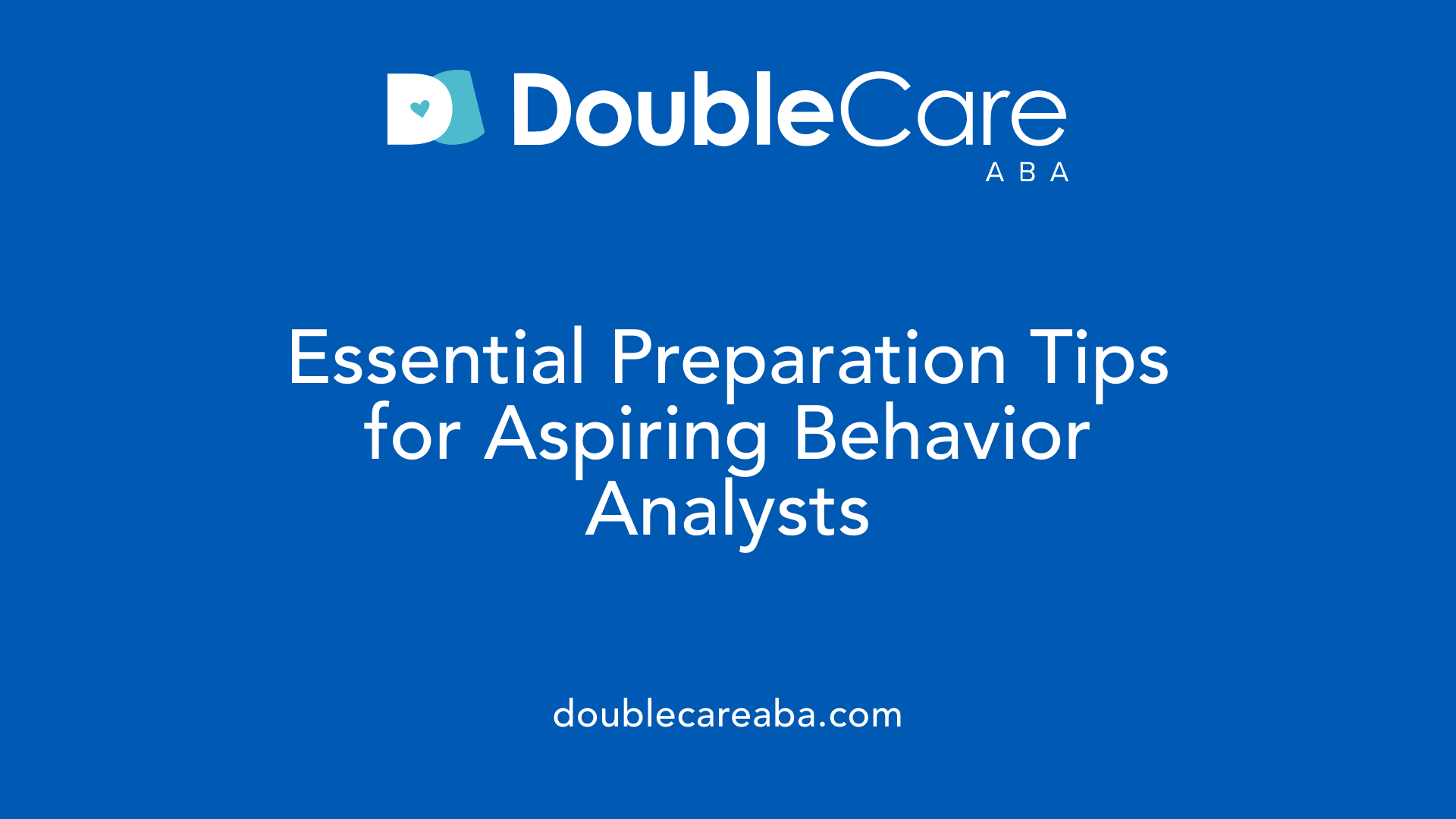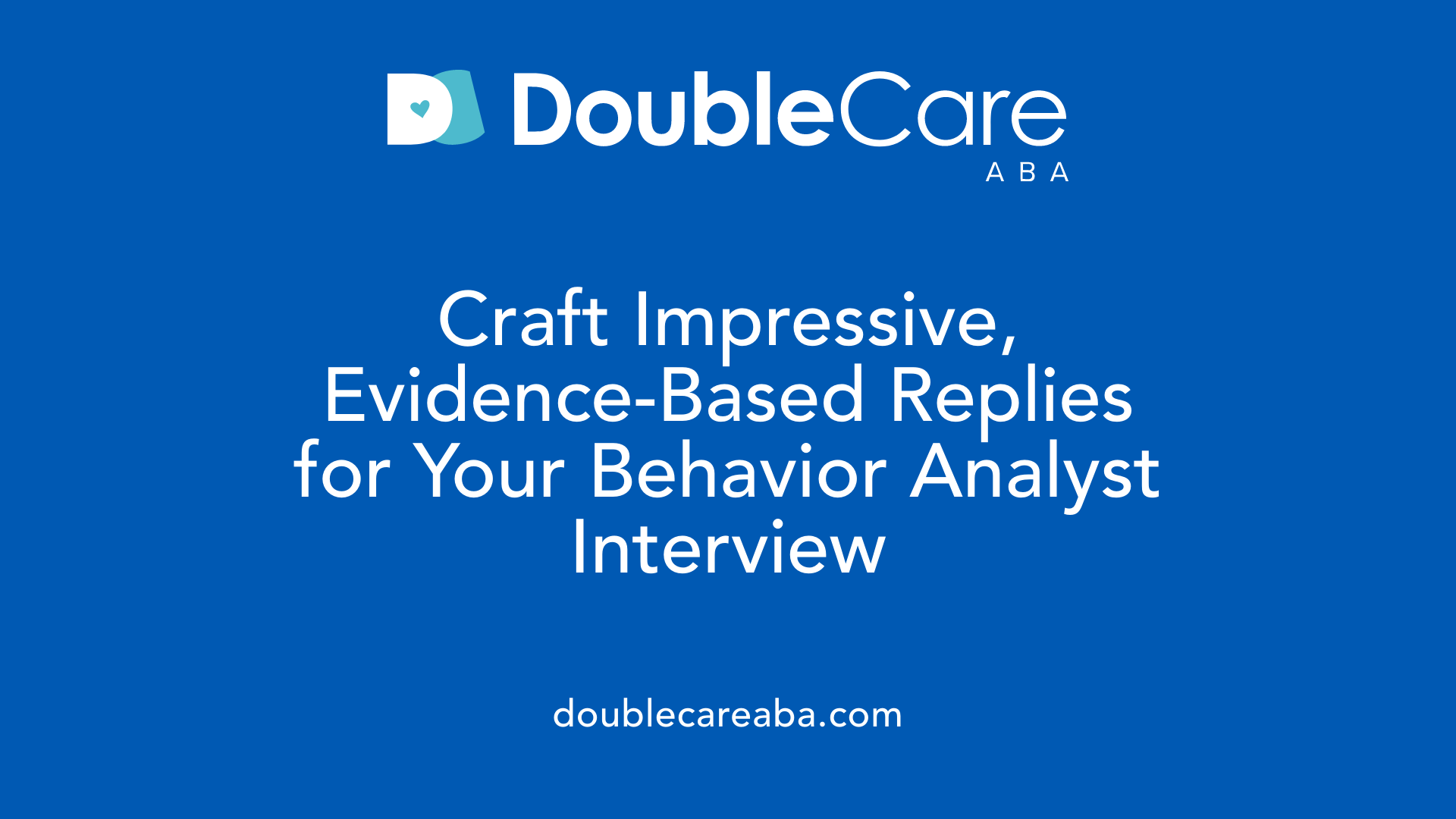Preparing for Success in Behavior Analyst Job Interviews
Securing a role as a behavior analyst involves demonstrating a comprehensive understanding of ABA principles, ethical standards, and practical intervention strategies. This guide offers an in-depth look into the common interview questions, effective responses, and preparation strategies to help you stand out as a qualified candidate.
Understanding the Interview Process for Behavior Analysts
The interview process for BCBA roles typically consists of several stages designed to assess both technical competence and interpersonal skills. After submitting an application, candidates usually undergo an initial screening. Successful applicants are then invited to participate in one or more interviews.
During these interview stages, candidates should be prepared to discuss their knowledge of applied behavior analysis (ABA) principles, experience with developing and implementing behavior plans, and strategies for handling challenging cases. Employers often include case discussions or practical assessments that reflect real client scenarios, such as working with non-verbal children exhibiting severe behaviors.
A critical part of the interview involves demonstrating your ability to utilize evidence-based interventions, like positive reinforcement, behavior modification, and extinction techniques, supported by current research. Your approach to measuring client progress—such as direct observation, data collection, and standardized assessments—is also scrutinized.
Apart from technical skills, employers evaluate your understanding of ethical practices outlined in the BACB's Professional and Ethical Compliance Code. They value candidates who emphasize client dignity, confidentiality, and informed consent.
After the interview, reference checks are typically conducted to verify your past work performance and professional conduct. The final step involves negotiations and onboarding, where expectations for ongoing professional development and collaboration are established.
The entire process aims to ensure that candidates not only possess strong technical skills but are also prepared to work as part of a multidisciplinary team, communicating regularly with caregivers and other professionals to promote client progress.
Understanding these steps can help candidates prepare thoroughly, showcasing their ability to adhere to ethical standards, apply behavior analytic principles effectively, and contribute positively to client outcomes.
For more detailed guidance, searching for 'behavior analyst interview process steps' can provide additional insights on specific interview formats and common questions.
Key Preparation Strategies for Aspiring Behavior Analysts

How should I prepare for a behavior analyst interview?
Preparing effectively for a BCBA interview involves multiple steps that showcase your knowledge, experience, and professionalism. Start by reviewing your personal experience with behavioral interventions, specifically highlighting successful cases where you applied principles of applied behavior analysis (ABA).
Develop specific examples that demonstrate your skills in developing and implementing behavior plans, conducting functional assessments, and measuring client progress. Being ready to discuss these examples points to practical competence.
Stay current with the latest research in ABA by reading reputable journals and attending conferences. This knowledge not only boosts your credibility but also allows you to include recent evidence supporting your intervention strategies.
Practice explaining your data collection methods, how you analyze data to inform treatment decisions, and how to adapt interventions based on client progress or setbacks. This will help you communicate clearly and confidently during the interview.
Familiarize yourself with the specific organization’s methods and philosophies, which shows your genuine interest and readiness to align with their approach. Finally, prepare thoughtful questions to ask interviewers about their team, case challenges, and professional development opportunities.
Good preparation demonstrates your commitment and equips you to positively address common interview questions related to evidence-based practice, ethical considerations, handling challenging cases, and interdisciplinary collaboration.
Common Interview Questions and Effective Responses

What are common questions asked during a behavior analyst job interview?
During a BCBA interview, candidates can expect a range of questions designed to assess their knowledge, skills, and ethical understanding related to applied behavior analysis (ABA). Typical questions include inquiries about past experiences with behavioral assessments and intervention development, especially in challenging cases such as working with non-verbal children or individuals with severe self-injurious behaviors.
Interviewers often ask candidates to explain ABA principles, demonstrate their familiarity with data collection methods, and describe how they measure client progress using direct observations, standardized assessments, and continuous data review. Questions about handling ethical dilemmas—such as maintaining client confidentiality and ensuring informed consent—are common, reflecting the BACB's Ethical Code.
Furthermore, candidates might be asked about their approach to team collaboration. Since a multidisciplinary and collaborative approach is vital in ABA work, interviewers look for examples of effective communication and coordination with caregivers and other professionals.
Sample questions include:
- How do you develop an individualized behavior plan?
- Can you describe a time when you had to modify an intervention due to a client plateau?
- How do you ensure interventions are evidence-based?
- What strategies do you use to handle client resistance?
Preparing comprehensive responses to these questions demonstrates both technical expertise and ethical integrity, crucial for a successful application.
How to approach discussing behavior assessment?
When asked about behavioral assessments, highlight your experience conducting functional analyses to identify the functions of challenging behaviors. Discuss how you use these assessments to inform tailored interventions.
How is progress measured in ABA?
Explain your methods for collecting data through direct observation and standardized tools. Emphasize your commitment to continuous review and adjustment of strategies based on empirical evidence.
What about handling ethical issues?
Describe your familiarity with the BACB's Ethical Code, emphasizing crucial principles like maintaining client dignity, confidentiality, and obtaining informed consent. Illustrate this with real-world examples.
Collaborating with others?
Share your experience working with a team—regular updates, shared decision-making, and joint assessments ensure consistent and effective client support.
Additional Resources: For more detailed insights into common interview questions and how to craft effective responses, searching for "common behavior analyst interview questions" can provide helpful guides and sample answers.
In summary, preparing for questions related to behavioral assessment, intervention planning, ethical considerations, data collection, progress measurement, and team involvement will give candidates a strong edge in BCBA interviews. Demonstrating a combination of technical knowledge, ethical understanding, and collaborative spirit is essential for success in these roles.
Strategies for Crafting Impressive Answers
 When preparing for a Behavior Analyst interview, it is essential to offer clear, structured, and relevant responses that demonstrate both your technical expertise and your professional attitude.
When preparing for a Behavior Analyst interview, it is essential to offer clear, structured, and relevant responses that demonstrate both your technical expertise and your professional attitude.
One effective approach is to utilize the STAR method—Situation, Task, Action, Result—to frame your answers. This technique helps convey your experience systematically, highlighting specific instances where you successfully addressed challenging cases or implemented evidence-based interventions.
Sharing detailed examples is particularly impactful. For example, you might describe working with a non-verbal child exhibiting severe self-injurious behaviors. Explain how you conducted functional assessments, developed tailored interventions based on current research, and involved a multidisciplinary team to support the client's progress.
Emphasizing ethical considerations aligns with the BACB's guidelines. Illustrate your commitment to client dignity, confidentiality, and obtaining informed consent. Discuss how you regularly review progress data, adjust strategies when progress plateaus, and ensure your practices uphold the highest ethical standards.
Demonstrating proficiency in data analysis and behavior measurement is crucial. Describe your experience with direct observation, data collection, and standardized assessments. Explain how continuous data review informs your decision-making process and refines intervention plans.
Finally, convey enthusiasm for professional growth. Mention your engagement with current research, attendance at conferences, and commitment to staying updated on best practices. Showing a proactive attitude towards ongoing learning reassures interviewers of your dedication to providing the best care.
| Practice Area | Example | Additional Tips |
|---|---|---|
| Response Structuring | Using STAR, sharing specific case examples | Keep answers concise and focused |
| Ethical Practice | Emphasizing confidentiality and client dignity | Cite relevant BACB ethical codes |
| Data Skills | Describing data collection and analysis | Highlight how data shaped outcomes |
| Professional Growth | Attending journals and conferences | Demonstrate ongoing learning enthusiasm |
Ethical Considerations Central to the Interview
What are the key topics and ethical considerations in a behavior analyst interview?
Candidates preparing for a BCBA role should be well-versed in the BACB Professional and Ethical Compliance Code. This includes understanding the importance of respecting client dignity and maintaining confidentiality at all times.
Informed consent is another vital aspect; professionals must ensure clients or their guardians clearly understand the scope and nature of interventions before initiating services. Ethical decision-making involves evaluating situations carefully, especially when faced with dilemmas such as conflicting interests or limited resources.
Handling potential conflicts of interest and managing dual relationships are critical concerns that require transparency and professional boundaries to prevent harm or compromised objectivity.
Adherence to professional standards and ongoing compliance with the BACB Code demonstrate a commitment to ethical practice. Candidates are often asked how they would approach scenarios involving ethical conflicts, ensuring they prioritize client welfare and uphold the integrity of the profession.
Understanding these fundamental ethical considerations reflects a candidate’s readiness to navigate complex situations in practical settings, ultimately ensuring the best outcomes for clients while maintaining professional standards.
Technical Knowledge and Application in ABA
What types of technical questions might be asked in a behavior analyst interview?
In a BCBA interview, candidates can expect to encounter a range of technical questions that assess their understanding of applied behavior analysis (ABA) principles and their practical application. These questions often explore how candidates design and implement behavior plans, conduct functional assessments, and analyze behavioral data.
Candidates should prepare to discuss methods for conducting assessments and how to interpret the findings to develop effective interventions. They may be asked about specific ABA techniques such as reinforcement schedules, behavior modification strategies, shaping, prompting, and extinction.
Understanding how to tailor interventions for unique client needs is crucial. For example, when working with non-verbal children or those exhibiting severe self-injurious behaviors, the candidate might be asked to describe their process of functional assessment and intervention planning.
Additionally, interviewers often inquire about data collection techniques, including direct observation, and using standardized assessments to monitor progress. Emphasizing the importance of continuous data review to make informed decisions about modifying treatment plans is essential.
Demonstrating familiarity with evidence-based intervention methods and the capacity to adapt strategies based on ongoing data is vital for success.
| Technical Area | Example Questions | Description |
|---|---|---|
| Designing behavior plans | How do you develop individualized behavior plans? | Explores planning process and criteria for choosing interventions |
| Conducting functional assessments | Describe your approach to a functional assessment. | Looks at assessment techniques and analysis |
| Data collection techniques | What methods do you use to collect behavioral data? | Focuses on observation tools and data accuracy |
| Reinforcement schedules | How do you determine the appropriate reinforcement schedule? | Assesses knowledge of reinforcement principles |
| Behavior modification strategies | Can you give an example of a behavior modification technique you've used? | Demonstrates practical application and strategy choice |
By preparing in these areas, candidates can confidently navigate the technical questioning in BCBA interviews, demonstrating both their knowledge and readiness to implement effective ABA interventions.
Sample Questions and Ideal Responses to Showcase Competence
What are some common interview questions for BCBA roles, and how should candidates respond?
Interviewers often ask behavioral analysts about handling complex cases, making data-driven decisions, collaborating with families, and solving real-world challenges. Preparing responses that illustrate your experience with these topics helps demonstrate your expertise.
How should a candidate approach discussing behavioral challenges?
Candidates should share specific examples where they identified challenging behaviors, such as severe self-injury in a non-verbal child. Explain how you conducted functional assessments to understand the behavior's purpose and then implemented tailored, evidence-based interventions supported by current research. Emphasize continuous monitoring and modifications based on data.
How can candidates demonstrate their ability to use data in decision making?
Describe your process for collecting data through direct observation, standardized assessments, and ongoing measurement tools. Explain how you review this data regularly to inform intervention adjustments, ensuring progress is measurable and objectives are met.
What is important when discussing collaboration with families and professionals?
Highlight your experience working in multidisciplinary teams. Discuss how you maintain open, continual communication and involve caregivers in planning and decision-making, aligning with ethical standards emphasizing client dignity and confidentiality.
How should a candidate tackle problem-solving in real cases?
Use examples of re-evaluating assessments when progress plateaus. Detail how you modify behavior plans, conduct additional assessments if needed, and adapt strategies based on empirical evidence. Showcase your ability to think critically and adapt effectively.
Sample Answer Structure for Questions
Candidates should prepare to answer with clarity, using the STAR method (Situation, Task, Action, Result). Focus on illustrating the use of ABA principles, ethical practices, teamwork, and success stories.
| Question | Response Highlights | Additional Notes |
|---|---|---|
| Handling a challenging case | Explain assessment process, intervention design, and adjustments | Emphasize evidence-based strategies and ethics |
| Using data for decisions | Discuss data collection methods, analysis, and plan modifications | Show commitment to continuous professional development |
| Collaborating with caregivers | Describe communication strategies, involving families in intervention | Include confidentiality and dignity considerations |
| Managing progress plateaus | Share steps for reassessment, intervention revision | Focus on empirical support and flexibility |
Further Resources
Candidates preparing for BCBA interviews should review current literature in applied behavior analysis and related professional guidelines. Continuous learning through journals, conferences, and official BACB resources enhances readiness.
Employing structured, evidence-based responses during interviews, aligned with ethical standards and collaborative practices, helps showcase competence and dedication as a behavior analyst.
Common Mistakes and How to Avoid Them
What are some common mistakes to avoid in a behavior analyst interview?
One critical mistake candidates often make is providing vague responses when discussing their experience or approach. For example, instead of saying they use "positive reinforcement," it’s better to detail how they tailor reinforcement strategies based on individual assessments and data analysis.
Failing to demonstrate ethical awareness is another common error. The BACB’s Ethical Code emphasizes client dignity, confidentiality, and informed consent. Candidates should be prepared to discuss how they incorporate these principles into their daily practice.
Avoid delivering responses that lack structure or focus. Clear, organized answers help interviewers understand your thought process, especially when explaining how you handle complex cases like non-verbal children with severe behaviors.
Additionally, many overlook the importance of quantifying their achievements. Highlighting measurable improvements, such as reductions in self-injurious behaviors through functional assessments and tailored interventions, strengthens your credibility.
Lastly, not demonstrating enough research about the organization can hurt your chances. Familiarizing yourself with the agency’s philosophy, current practices, and how they align with evidence-based techniques shows genuine interest and preparedness.
How can I prepare to avoid these pitfalls?
Research common interview questions related to applied behavior analysis, such as how to develop behavioral plans or handle challenges like client resistance. Practice structured responses that include specific examples and data to support your points.
Review the BACB’s Ethical Code and be ready to incorporate ethical scenarios into your answers. Also, prepare to discuss ongoing professional development, like recent journal articles or conferences you've attended.
Organize your thoughts beforehand, possibly using the STAR method (Situation, Task, Action, Result) to ensure your responses are detailed and focused.
Looking for more tips? Searching for "behavior analyst interview mistakes to avoid" can provide additional insights from professionals who have successfully navigated the process.
In summary, avoid vague, unstructured answers; emphasize your ethical commitment; quantify your successes with data; and demonstrate thorough knowledge of the organization. These approaches will help you stand out as a competent and ethical candidate.
Demonstrating Practical Experience Effectively
How can I showcase my practical experience with ABA interventions during the interview?
When applying for a BCBA role, it's essential to highlight your hands-on experience with clients. A strong way to do this is by sharing detailed case examples where you successfully implemented behavior interventions. Describe the specific challenges faced, such as working with a non-verbal child demonstrating severe self-injurious behaviors.
Be prepared to discuss your data collection methods—using direct observation, standardized assessments, and continuous data review. Explain how you analyzed this data to make informed decisions about intervention adjustments.
Demonstrate your adaptability by illustrating how you re-evaluated assessments and modified strategies when progress plateaued. For example, you might have incorporated additional assessments or switched to alternative reinforcement techniques based on data insights.
Highlight your teamwork in collaborating with professionals, caregivers, and other team members. Emphasize regular communication, coordinated efforts, and ongoing professional development through journals, conferences, and new research.
Effectively showcasing your practical experience involves integrating your technical skills with teamwork and continuous improvement efforts. This approach demonstrates your comprehensive understanding of applied behavior analysis and your commitment to client success.
Handling Challenging Cases and Ethical Dilemmas
 Managing challenging cases in behavior analysis requires a thoughtful, evidence-based approach. When progress stalls or ethical dilemmas arise, it’s crucial to revisit and re-evaluate the current intervention plan.
Managing challenging cases in behavior analysis requires a thoughtful, evidence-based approach. When progress stalls or ethical dilemmas arise, it’s crucial to revisit and re-evaluate the current intervention plan.
The first step often involves re-assessing the client’s behaviors and existing data collected through direct observation and standardized assessments. Re-evaluation may uncover new insights or reveal that initial assessments missed critical factors.
If progress plateaus, additional assessments—such as functional analyses or newer diagnostic tools—may be necessary. Based on these findings, behavior analysts can modify intervention strategies, integrating alternative or more intensive techniques supported by current research.
In ethical terms, maintaining the client’s dignity, confidentiality, and obtaining informed consent are foundational. Behavior analysts must ensure that all adjustments align with the BACB’s Professional and Ethical Compliance Code, emphasizing client rights and wellbeing.
When faced with ethical conflicts, transparent communication with caregivers and team members is vital. Collaborating with a multidisciplinary team can offer diverse perspectives, enabling more holistic and respectful solutions.
Ultimately, managing tough cases involves a cycle of continuous assessment, strategic modifications, and unwavering commitment to ethical principles. This approach not only improves client outcomes but also sustains professional integrity.
For further guidance, searching for "managing challenging cases ethically" can provide valuable resources and case examples from reputable sources, enhancing practical understanding of this complex aspect of behavior analysis.
Behavior Analysis in Practice: From Clinical to Field Settings
What populations do behavior analysts typically work with?
Behavior analysts serve a diverse range of clients, including individuals with autism spectrum disorders, intellectual disabilities, emotional disturbances, and developmental delays.
Their primary goal is to enhance clients' quality of life through tailored, evidence-based interventions. Whether working in clinical settings, schools, or community environments, behavior analysts adapt their strategies to meet each individual's unique needs.
How do behavior analysts handle challenging cases?
When faced with difficult situations, such as severe self-injury or resistance to intervention, behavior analysts conduct thorough functional assessments. These assessments help identify the reasons behind challenging behaviors and guide the development of effective intervention plans.
A practical example is working with a non-verbal child who displays severe self-injurious behaviors. The analyst collects data through observations, identifies triggers, and then implements targeted strategies like positive reinforcement or extinction to reduce harmful behaviors.
Ensuring interventions are supported by research
Interventions used by behavior analysts are grounded in current scientific research. They regularly review the latest studies and attend professional conferences to stay informed. This continuous learning ensures that clients receive interventions proven effective.
Collaboration and communication
Successful behavior change often involves a team approach. Behavior analysts work closely with caregivers, teachers, speech therapists, and other professionals. Regular communication and shared data review ensure everyone is aligned and progress is monitored effectively.
Measuring progress accurately
Progress measurement relies on direct observation, data collection, and standardized assessments. Continuous data review helps determine whether strategies are effective or need adjustments. When progress plateaus, behavior analysts re-evaluate assessments and modify intervention plans accordingly.
Ethical practices in behavior analysis
Adherence to the BACB's Professional and Ethical Compliance Code is fundamental. This includes respecting client dignity, maintaining confidentiality, and obtaining informed consent before starting any intervention.
Handling setbacks and plateaus
When clients' progress stalls, behavior analysts reassess assessments and refine strategies. Additional assessments may be conducted, and intervention plans are adapted to break through plateaus and continue progress.
| Client Populations | Typical Interventions | Ethical Considerations |
|---|---|---|
| Autism Spectrum Disorders | Positive reinforcement, behavior modification | Informed consent, confidentiality |
| Intellectual Disabilities | Extinction, skill building | Dignity and client rights |
| Emotional Disturbances | Functional communication training | Client safety and respect |
| Developmental Delays | Data-driven decision-making | Ethical conduct and ongoing professional development |
This multidisciplinary, evidence-based approach ensures that behavior analysts provide effective and ethical support, helping individuals achieve meaningful improvements in their lives.
The Importance of Continuous Professional Development
How can ongoing professional development impact my role as a behavior analyst?
Staying engaged in ongoing learning is essential for success as a behavior analyst. Regularly reviewing reputable journals and attending conferences introduces you to the latest research findings and innovative practices.
By keeping abreast of new evidence-based techniques, you ensure your interventions are current and effective. This not only improves client outcomes but also reinforces your professional credibility.
Engaging with professional development opportunities also helps sharpen your skills in developing tailored behavior intervention plans and managing complex cases, such as working with non-verbal children exhibiting severe self-injurious behaviors.
Additionally, continuous learning supports adherence to the BACB's ethical standards. It encourages a reflective practice, allowing you to update strategies when progress plateaus or challenges arise.
How do journals and conferences support growth?
Journals provide detailed accounts of recent research and case studies, which can directly inform your daily practice. Conferences offer workshops, networking opportunities, and expert insights, creating a dynamic environment for skill enhancement.
Why is evidence-based practice crucial?
Implementing interventions supported by current research ensures your methods are both effective and ethically sound. It helps in tailoring strategies—such as positive reinforcement or extinction techniques—to each client’s unique needs.
Table of Professional Development Activities
| Activity | Benefit | Example |
|---|---|---|
| Reading scholarly journals | Stay updated on latest research | Behavioral Analysis in Practice |
| Attending conferences | Skill building and networking | ABA International Conference 2024 |
| Participating in workshops | Hands-on skill enhancement | Data collection and analysis techniques |
| Continuous education courses | Maintain certification standards | BACB-approved online courses |
Regular engagement with these activities fosters a culture of learning, ensuring you provide the best possible care for your clients. Over time, this ongoing development directly influences your ability to develop effective, ethical, and individualized intervention plans.
Preparing for Your Interview Success
Thorough preparation and ethical awareness are crucial for succeeding in a behavior analyst interview. Demonstrate your expertise through detailed examples, stay updated on the latest research, and show your commitment to ethical practice and continuous growth. With careful planning and confidence, you can effectively showcase your capabilities and secure the role you aspire to.
References
- 6 Board Certified Behavior Analyst (BCBA) Interview Questions
- 25 Behavior Analyst Interview Questions and Answers - CLIMB
- 6 Behavioral Analyst Interview Questions | NACDD
- 7 Behavior Analyst Interview Questions & Answers - Astra ABA
- 6 Behavioral Analyst Interview Questions | NACDD
- 6 Board Certified Behavior Analyst (BCBA) Interview Questions
- Behavior Analyst Interview Questions - Betterteam
- How to prepare for a behavior analyst interview in 2025?
- Questions to ask an ABA therapist | Autism Speaks













